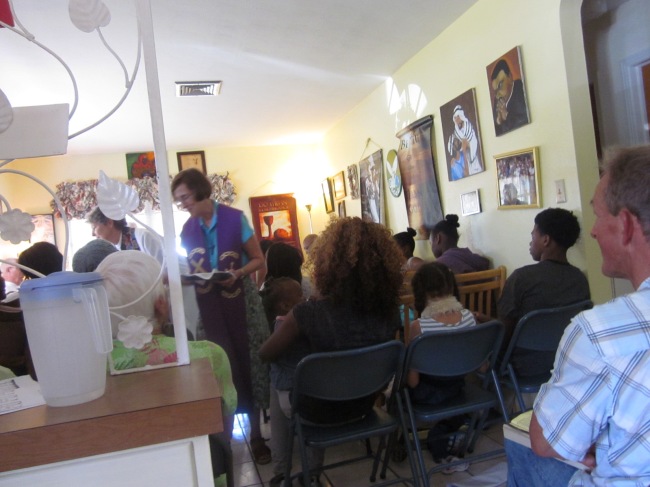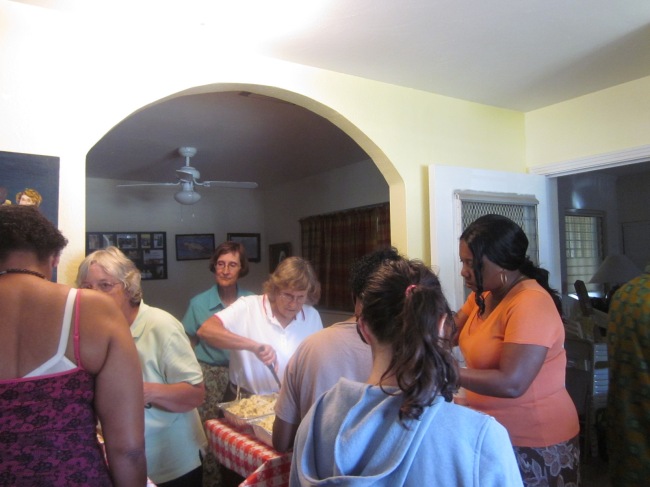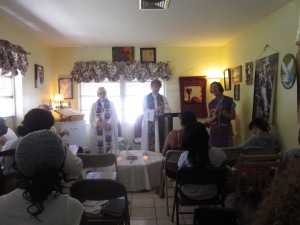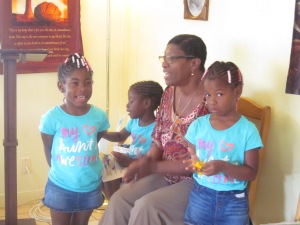Pastor Judy Beaumont and visiting womam Priest Judith McCloskey serve the Living Water at the Good Shepherd Church
In the Lenten spirit we begin with a prayer: “Our loving God, we thirst. Our lives are dry as the desert in the noon day sun. We have climbed the craggy mountain to find You and we have miles to go and we are thirsty. We are thirsty for You, for your love, for your truth. Yet we push You away with our self-importance, our busy-ness our arguing and our tests. We thirst for love and You pour it out in our hearts, yet we turn away. Still, you draw water from a rock and place within us a bubbling spring of life. We thirst for justice yet we look for immorality and fault in other people and nations rather than join together in working for your kin-dom. Help us to drink the water of understanding that Jesus offers and forgive us for our self-centeredness. May we join with inspired and courageous women and men of all nations to build Your kin-dom now and forever….Amen.”
The readings for this Sunday are alive with hope, meaning and symbolism. In the reading from Exodus 17: 3-7 we have hard rough craggy rocks and desperately thirsty people and we have life giving water. Imagine a land and a people completely dry and thirsty. Imagine wandering in this place for years hoping to find your promised land. I’m sure I would be one of the loudest grumblers. I remember my terrible thirst when I could not have water by mouth after waking from a major operation. All I wanted in all the world was that water. Poor Moses, he is doing his best and everyone is turning on him. God has him turn it all around and bring water flowing from the rocks of Mt. Horeb. Sometimes I wonder if in his frustration if Moses didn’t just hit the rock as hard as he could, like impetuously kicking a stone before you even if it breaks your toe, releasing an underlying stream! God is still with Moses and the people. The rock is struck and the water flows. Yet in the Psalm (95) we are asked not to harden our hearts by the kind of faithless grumbling and arguing that took place in the desert with Moses. Hearts can become hard as rocks. Only with faith can we knock them hard enough to find God in our midst and make the sweet water of life flow again.
In the Epistle (Romans 5: 1-2.5-8) we learn that through Christ we can look forward “confidently and joyfully to the day on which we will become all that God has intended” (Rom 5:2 The Inclusive Bible). “And such a hope does not disappoint, because the love of God has been poured out in our hearts through the Holy Spirit, who has been given to us” (v. 5). Instead of hard, wizened dysfunctional hearts the flowing water of God’s love fills our hearts and enlivens us. Wow! Like water pouring out of the rock, God’s love is poured out in our hearts! When one of our founding Bishops, Patricia Fresen, was ordained by the male Bishop in communion with the Church, she was told “this is not for you, it is for the church”. Indeed, the love poured into our hearts is meant to be shared with all of God’s people. It is not for ourselves to keep. By the water liberally poured on our heads in baptism we all are ordained with God’s love to serve one another. In this Lenten season we need to look within and act outwardly. What are we doing to share the outpouring of God’s love with the most outcast and thirsty for love and acceptance and basic sustenance among us? This is what Jesus shows us in the Gospel when he talks with the Samaritan woman at the well.
Good Shepherd’s Pearl Cudjoe and Kathy Overby and Kathy Lauwagie our “Snowbird members” serve a hot meal
as Rev. Judith Mc Closkey stands ready to help.
In the encounter with the Samaritan woman (John 4:5-42) we have Jesus breaking cultural and religious taboos in order to offer the “living water”-not only to a maligned woman who has to come alone to the well in the heat of the day and not with the other women, but to a much maligned nation-Samaria. In Aramaic idiom “living water” is a metaphoric way of saying “true teaching”. In John 7:37-38 when Jesus says “come and drink” he is saying come and learn. And if we do believe in (and believe in means more likelove Jesus and his way) and drink-learn the way “streams of living water will flow” from us. We too can share the living water with everyone! The living water is the teaching that is salvific, saves lives.
Jesus is breaking stereotypes and making new paradigms. Jesus starts a conversation with a Samaritan woman by asking for a drink of water. It turns out to be the longest conversation that is ascribed to Jesus in the Gospels. The content is extremely important. Jesus tells her who she is, that he knows her, she has had five husbands and is now with a sixth. Perhaps she had to marry her deceased husband’s brothers in a Levirate marriage. She may or may not be a sinner, but Jesus is not condemning her. This is about a sinful nation, one that has turned away from God, more than it is about a sinful woman. She has the temerity to argue with Jesus and to discuss as Rabbis would. But Jesus is extending himself both to the woman (and by extension to all women) and to the nation through empowering her to be an apostle to her people. He is presenting himself, his teaching as living water, true teaching. But is this water only for the “Chosen” people? No, it is for everyone, for women, for men and children, for all people and for all nations, even those thought to be “enemies” and “worshippers of other gods”, in this case, for Samaria. Samaria was a country known in the Hebrew Scriptures for the worship of Baal and other idols (yes, we recall from last Sunday that Elijah challenged King Ahab and his 850 prophets on Mt. Horeb in what was then Samaria). In John 7 people also called Jesus a Samaritan in a highly pejorative way. The Jewish people saw the Samaritans as a mixed race people having a religion that was not faithful to Jewish Law because of so much intermarriage. Samaria had fallen by that time to five rulers with different religious proscriptions. The Samaritans saw themselves as following the Law. They fought with the Jews over where to worship God and that is one of the dialogues Jesus has with the woman at the well. He tells her that God is a Spirit Who must be worshipped in spirit and in truth not in a particular place. That prompts her to mention the Messiah and Jesus tells her that he is the Messiah. Imagine that! In his time men did not even talk to women let alone share earth shaking information. She then runs and tells everyone and many come to learn from and believe in, love, Jesus.
Through this woman, whose name we wish we knew, Jesus is offering the living water, his way, and himself to a small, powerful, and despised nation. Jesus is radically inclusive here. He does the forbidden-talking with a woman- and even more taboo, he is talking with a Samaritan. He reveals God’s identity (Spirit and Truth) and his own identity as Messiah to this woman and her people.
He transforms her as one ignored by men and possibly shunned by her own people to an apostle. He certainly does not see her as a worthless woman nor does she act like one when she boldly speaks with him and then goes and tells who he is. She and her people are then transformed by the outpouring of God’s love.
Let us follow Jesus in pouring out God’s love and the waters of life on everyone!
In the pictures below we are singing joyfully.
A-A-A-men.
Rev. Dr. Judy Lee, ARCWP
Pastor Good Shepherd Inclusive Catholic Community
Fort Myers Florida





No comments:
Post a Comment